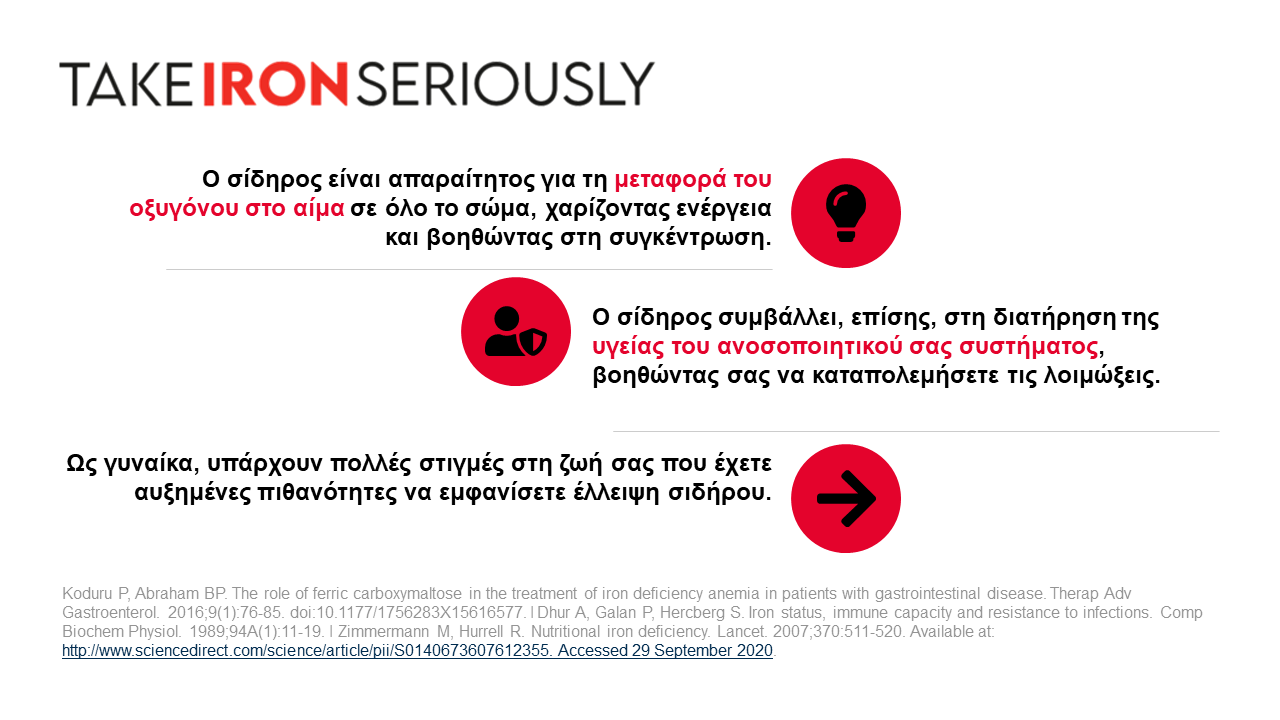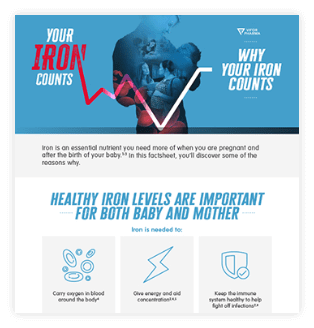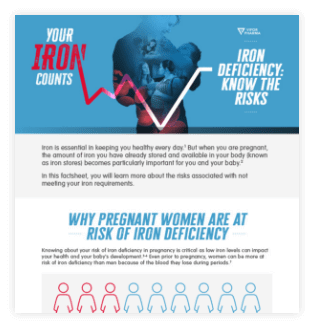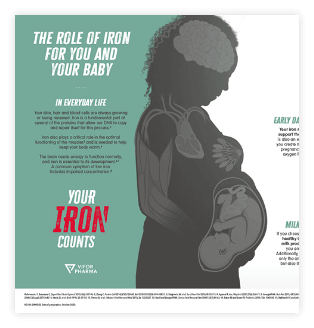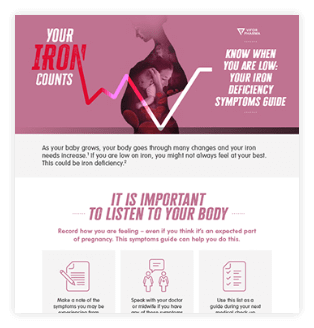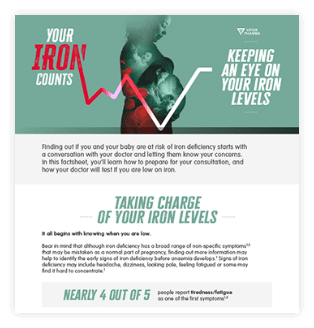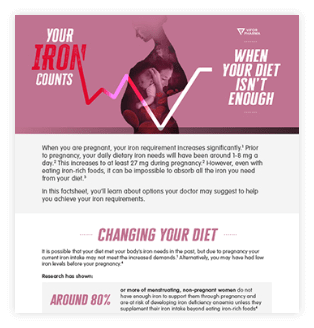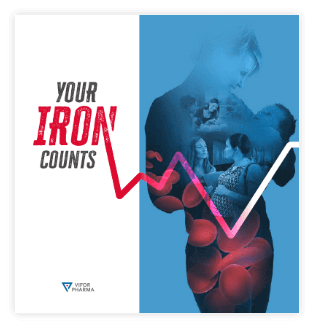Iron deficiency in pregnancy is more common than you think.1 Knowing if you are at risk is important for your health and your baby’s development.2-5
Here you’ll learn why your iron counts and the role it plays for both you and baby – from symptoms to watch out for through to what you can do to keep an eye on your iron levels.
Motherhood can be full of ups and downs –
IRON LEVELS shouldn’t be one of them.
Balanced iron levels support:

Maternal health in
pregnancy & delivery1,6

Baby’s growth &
development1,4,5

Milk production &
breastfeeding7,8
BE AN IRON MUM
TALK TO YOUR DOCTOR TO KEEP IRON ON TRACK
Throughout pregnancy and after birth, you need significantly more iron, but your iron stores may not be enough.9,10
Iron is more important than ever when you’re pregnant.1,9,11
As you progress on this journey, you’ll need more iron for your baby’s growth and to prepare your body for your new arrival.1,9
Despite a change of diet, you may miss out on the iron you and your baby need and your existing iron stores must be used instead.2,10
up to 4 in 10
women begin their pregnancy
with low iron stores1
Unless women supplement their iron intake, they may be at risk of iron deficiency, which can lead to
iron deficiency anaemia. This can increase with each trimester.9-11
Know your risk
You may be at risk of becoming iron deficient or developing iron deficiency anaemia during pregnancy if you already had low iron levels before you were pregnant, if you have had another recent pregnancy or if you are having twins (or more).1
Low iron may lead to:

Iron deficiency anaemia & increased risks associated with blood loss at delivery1,9

Low birth weight or a premature baby3

Impaired brain development & low IQ in baby1,4

Reduced physical performance & mental wellness1,12
Talk to your doctor if you think you are at risk so they can help you manage your iron levels.
Learn the facts:
HQ-NA-2000075. Date of preparation: October 2020

Balanced iron levels are essential for a healthy pregnancy and important for your baby’s development and health.1,5,6,13
As you enter into motherhood, it is important to keep your iron levels on track.
Healthy iron levels support your baby’s growth and development,1,4 and help you handle the demands of pregnancy and baby’s arrival as you create the first memories with your newborn.1
Did you know?

Iron is needed for the growing placenta which feeds oxygen & nutrients from mother to baby9,14

Your baby relies on the iron stored from you during pregnancy to grow strong & healthy from the start1,5,13

Healthy iron levels can support milk production if you choose to breastfeed your baby7,8
Balanced iron levels also help with your health and mental wellness as you bond with your baby in
the early days,12 and help keep your immune system healthy to fight off infections.1,15
Furthermore, iron is needed to carry oxygen in blood around your body, to give energy and aid
concentration.1,15,16 To handle the demands of a newborn baby, you’ll need all the energy you can get!
Learn the facts:
HQ-NA-2000075. Date of preparation: October 2020.

Take charge of your iron levels by talking to your doctor about your symptoms and knowing when you are low.
It is essential to find out what options are available during pregnancy. Finding out if you and your baby are at risk of iron deficiency starts with a conversation with your doctor or midwife, and letting them know your concerns.
As you progress through each trimester, it’s important to continue discussing how you are feeling with your healthcare professional.
Symptoms
Iron deficiency and iron deficiency anaemia have a broad range of non-specific symptoms which may be mistaken as a normal part of pregnancy.17,18
For example, exhaustion and fatigue are common features of low iron.18 While tiredness can be a part of being pregnant, fatigue (mental and physical exhaustion) is different19 and it could be a sign of iron deficiency.18
Other symptoms include:

Headache18

Dizziness18

Difficulties concentrating19

Pale complexion18

Pica (abnormal cravings for
non-food items)18,20,21
How your doctor can help
To understand your symptoms, your doctor should ask:
When
symptoms
Started
How Severe
they are
what, if anything Makes them
worse
Throughout pregnancy, your doctor should check for iron deficiency and iron deficiency anaemia.18 They should also ask about your lifestyle and medical history to help identify any iron deficiency risk factors.1,17
Getting your iron levels checked can help to identify iron deficiency earlier before anaemia develops.18
Getting your iron on track
If you can, eating iron-rich foods is one of the first steps to boosting your iron levels.22
This may include eating foods that contain sources of iron such as red meat or plant-based sources including lentils, beans and spinach.22,23 Food and drink high in vitamin C help your body absorb iron.22
If diet alone doesn’t restore the iron you need,10 your doctor can advise on iron therapy and may prescribe:
Oral iron in the form of tablets or liquid11,22
Intravenous iron11
Motherhood can be full of ups and downs – IRON LEVELS shouldn’t be one of them.
BE AN IRON MUM
TALK TO YOUR DOCTOR TO KEEP IRON ON TRACKHQ-NA-2000075. Date of preparation: October 2020.
Find out the facts
A range of resources are available to help you keep your iron on track.
Factsheets:
- Breymann C. Expert Rev Obstet Gynecol 2013;8:587-96.
- Friedrisch JR and Friedrisch BK. Biochem Insights 2017; 10:1-18.
- Alwan NA, et al. Br J Nutr 2015;113:1985–92.
- Lozoff B, et al. Nutr Rev 2006;64:34-91.
- Rao R and Georgieff MK. Semin Fetal Neonatal Med 2007;12:54-63.
- Villar J, et al. J Nutr 2003;133:1606–25.
- Henly SJ, et al. BIRTH 1995;22:87-92.
- França EL, et al. J Matern Fetal Neonatal Med 2013;26:1223-7.
- Bothwell TH. The American Journal of Clinical Nutrition 2000; 72: 257S-64S.
- Achebe MM and Gafter-Gvili A. Blood 2017;129(8):940-49.
- Milman N. Ann Hematol 2008; 87:949-59.
- Milman N. Ann Hematol 2011; 90:1247-53.
- Baker RD and Greer FR. Pediatrics 2010; 126:1040-50.
- Desforges M and Sibley CP. Int J Dev Biol 2010;54(2-3):377-90.
- Beard JL. J Nutr 2001; 131:568-80.
- Camaschella C. N Engl J Med 2015;372:1832-43.
- Soppi ET. Clinical Case Reports 2018; 6(6): 1082-86.
- Pavord S, et al. BJH 2020; 188: 819-30.
- Dittner AJ, et al. Journal of Psychosomatic Research 2004; 56: 157-70.
- Lumish RA, et al. The Journal of Nutrition 2014;114(10):1533-9.
- Rabel A, et al. J Am Assoc Nurse Pract 2016;28(2):116-20.
- Alleyne M, et al. Am J Med 2008; 121 (11): 943-48.
- IQWIG. Pregnancy and birth: Do all pregnant women need to take iron supplements? Disponible en línea: https://www.ncbi.nlm.nih.gov/books/NBK279574/. Consultado en octubre de 2020.
HQ-NA-2000075. Date of preparation: October 2020.

